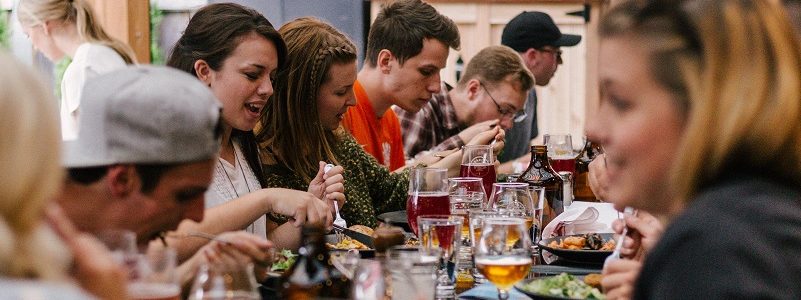Eating is a vital part of our lives.
You may notice that eating is a very charged topic!
We fervently defend what we want to eat.
Americans seem to have opportunities to eat all the time!
We eat on the run, as a business meeting, or with the whole family.
We eat because we are hungry, because we are tired, because we are upset or because we are celebrating.
There are many reasons to choose who we eat with, what we eat, when we eat, where we eat, and why we eat.
This article is not a morality-minded or research-driven treatise on eating. Instead, it is an exercise in awareness from a perspective one step back, looking at our choices in eating. I am using the five W’s of news journalism: who, what, when, where, and why to explore this.
Who
Eating is not usually a solitary activity, although it can be. Eating can be a socially nurturing experience.
Growing up, my family ate together by default, especially dinner. The children were called from doing their homework or play on the weekend, and Mom put dinner on the table and Dad came from watching the news, and we all ate together. It strengthened the bonds of our family as we talked about what happened during the day.
We celebrate birthdays, graduations, retirements, in fact, many milestones with meals together with family and friends. We celebrate holidays with gathering for feasts. Thanksgiving is a nationalized reason for eating together while giving thanks. For me, it is an opportunity to take pictures to remember the people celebrating together at these kinds of dinners.
A meal can be shared for a business meeting or a date. We socialize over food and the act of eating together demonstrates that we are sharing.
Our choice of eating alone, or who we choose to eat with can affect our digestion. Any social situation causing us to be stressed will inhibit digestion. Feeling comfortable with our dinner companions is a good way to improve digestion. In fact, we may choose to eat with the right person in order to help our digestion.
When you are aware of who you are choosing to eat with you can notice its effect on you emotionally, mentally and physically.
What
When we want to control our eating for a particular purpose such as weight loss or reversing disease such as diabetes, we often pay close attention to what we are eating.
There are moral, religious and preference reasons in choosing what we eat.
Economics can play a role in what we eat, as poverty often goes with cheap poor quality foods.
There are many reasons to choose certain foods to eat, and it is as varied as the time of year, what is available, our perception of what is good for us, as well as social influences.
As a Naturopathic doctor, I recommend individualized eating plans for certain health conditions, respecting the ethical concerns of the individual. These plans can change seasonally, as the health condition changes, and for many other reasons.
I advocate for not getting stuck on eating certain foods and avoiding other foods. Adaptability and flexibility is a good principle for eating as well as life. That said, there are some foods which are like medicine for us as well as others which have a harmful effect. I see some patients do better eating red meat, others gluten-free, and still others dairy-free. It is individual for the person and their health condition.
Overall, I like the conclusion of Michael Poulan as he writes in The Omnivore’s Dilemma: “Eat food, not too much, mostly plants.” By “food” he means something your grandmother would recognize as food and will eventually rot.
Often, it helps to defer to the “why” of eating to decide what to eat.
When
When I was growing up, my family ate three meals a day, and it was frowned upon to snack in-between. The exception to this was having nuts or appetizers before dinner for a holiday celebration.
Then, with the growing diagnosis of “hypoglycemia”, or low blood sugar – which could result in “hangry” episodes – people were told to eat every 2 hours. This resulted in five or more meals, snacks, or mini-meals a day.
With the availability of snacks at gas stations, convenience stores, vending machines at work and school, and even the chips, nuts and candy at home, people in the USA adopted the habit of grazing through the day and night.
There is even dieting advice to eat small amounts throughout the day.
The first thing to know about when we eat is that it is perhaps the most powerful way to affect out physiology. When we eat and when we don’t eat – or fast – affects the primal hormone insulin, as well as other natural physiological processes. These wide-reaching effects have been harnessed by Nature cure practitioners and adopted by Naturopathic Physicians.
Being hungry all the time is evidence of dysregulated blood sugar and insulin. In fact, eating frequently can lead to this dysregulation and, once imbalanced, sustain this imbalance. The diagnoses of Insulin resistance, pre-diabetes, and diabetes are the results of this dysregulation.
When it is hard to go long hours without eating, there is a loss of metabolic flexibility. The shakiness, lightheaded, or even hangry episodes show low blood sugar. This can happen easily when blood sugar has spiked by eating high carb foods, especially when eaten often. A metabolically flexible person can adapt to fat burning when all fuel from a meal is gone, such as after extended hours after eating and does not get adverse symptoms.
In fact, we naturally do not eat for long hours while we are sleeping. When we wake up, we “break fast.” A lot of people are not hungry in the morning, and there is evidence that our built-in daily rhythms are for a low appetite in the morning.
We have been told that breakfast is the most important meal of the day. Research on intermittent fasting has shown that for most of the US population, those with dysreguated blood sugar and insulin, extending the night-time fast into the morning can have huge benefits on re-regulating and improving health. By narrowing an eating window to 10, 8, 6, or even 2 hours can produce a huge reversal of blood sugar dysregulation and improve health. This is a powerful example of when you eat affects your health.
That said, a variety of times to eat promotes metabolic flexibility as well. By alternating days of narrow eating windows with a day or so of feasting, we can fulfill the who, where and what of eating while honoring the when of eating.
Where
In the USA, a full 20% of food is eaten in the car. What does that say about us?
I throw this back to you: how do you feel when you eat at a table with friends and how do you feel eating on the run?
You know from your experience how it affects you to choose a location to eat.
Why
I believe eating fulfills many needs and wants, and our why for eating can change from morsel to meal. I honor all whys for eating.
Yes, nourishment is fundamental to why we eat. Physical nourishment, social nourishment, aesthetic nourishment, in fact, nourishment on any and all levels can be why we eat.
Being mindful of eating can go a long way to discovering our impulses to eat, our why of eating. Being mindful while we eat can also show us why we are eating in the moment. Mmmm: enjoyment, satisfying hunger, feeling comfort, being adventurous . . .
As with most habits, we tend to eat to change our state of mind and body. That can be a big why of eating. What we eat, with whom, where, and when have powerful effects on our inner state.
I suggest that when we eat may be the most powerful of these. We can examine our why of eating at the time we get a trigger to eat, whether it is because we are hungry or simply food is available or it is time to eat. We can examine our who of eating when we get a trigger to eat by seeing when that is, what the context is. We can examine our what of eating when it is timed with when we desire to eat. We can examine where we eat when we fulfill the trigger to do so, showing us when.
When we eat implies choosing when we don’t eat as well. This choice involves our why of eating. With a powerful why, such as for health, specifically for my particular health condition, we can choose when to eat and when to abstain from eating. Both have a powerful effect on inner state, physiology and longevity. Perhaps more than you realized.
What awareness can you bring to eating? Has this opened it up to go beyond only what you eat, to embrace with whom, when, where, and why? Please comment below.





